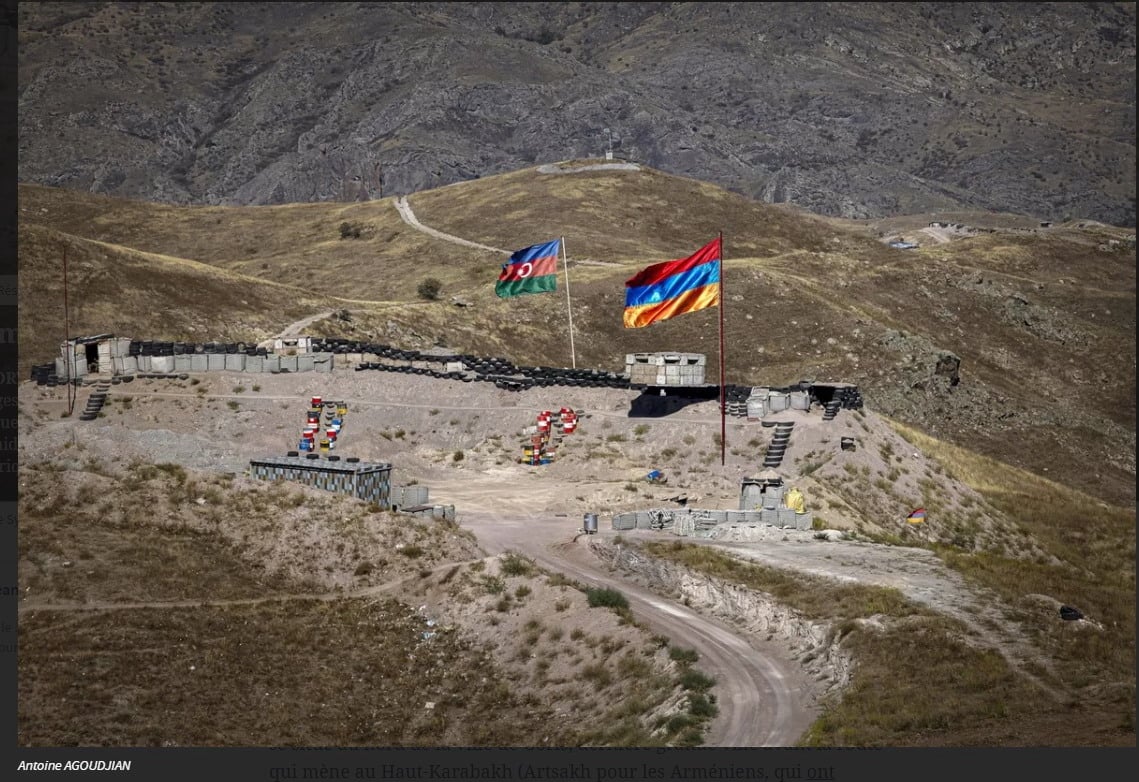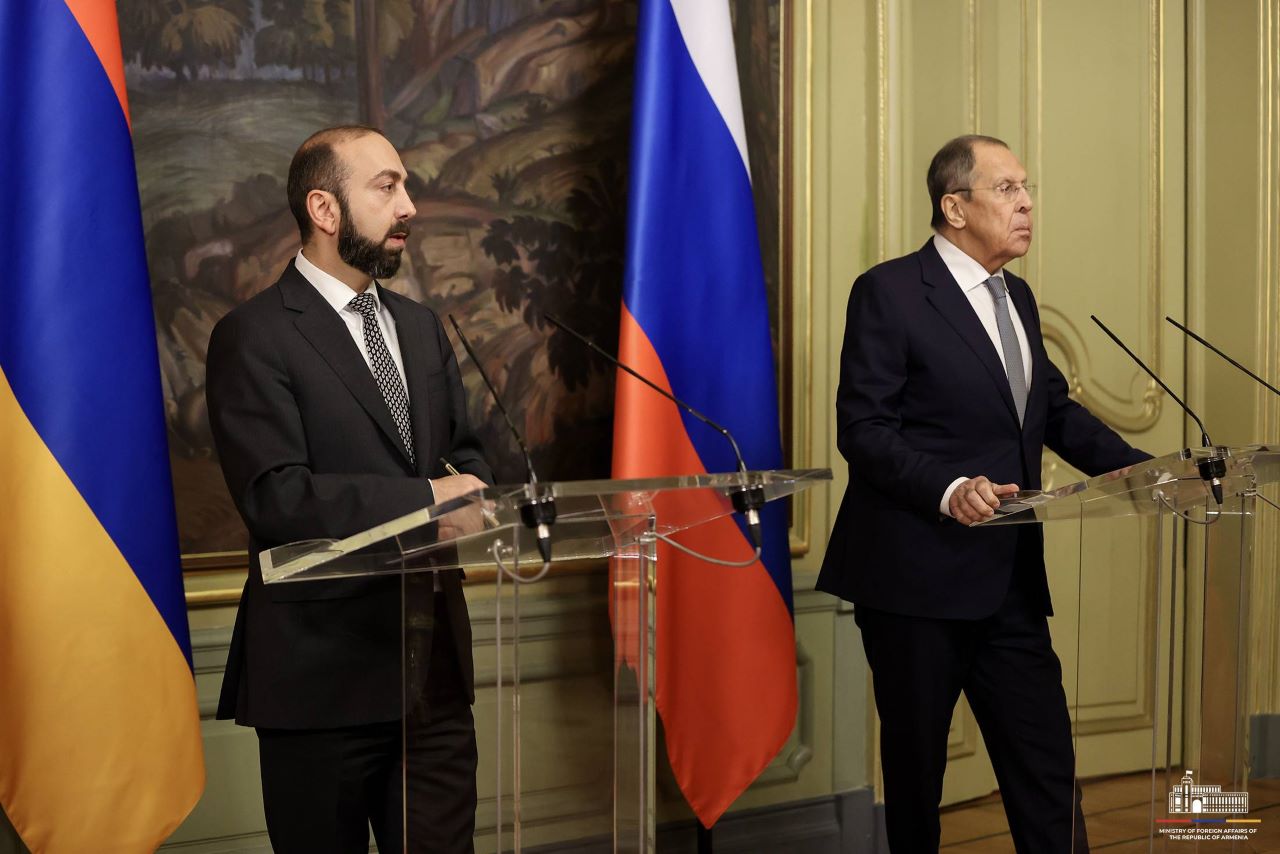Study finds Armenia’s reliance on Russia now national security threat
Armenia’s dependence on Russia seen as security threat
“Dependence on Russia in various sectors has turned into a set of challenges that limit Armenia’s freedom and may be used as tools of hybrid warfare against it,” argue political analysts Areg Kochinyan and Robert Ghevondyan in a study by the Centre for Security Policy Research.
The authors point out that while Armenia’s one-sided reliance on Russia has long been a feature of bilateral relations, it has only recently begun to be seen as a threat — particularly after the 44-day war and the forced exodus of Armenians from Nagorno-Karabakh. Russia’s refusal to provide military support following Azerbaijan’s incursion into Armenia’s sovereign territory was seen as a turning point.
“Russia has effectively abandoned its treaty obligations to guarantee Armenia’s security, as well as its peacekeeping commitments and responsibilities in Nagorno-Karabakh,” the report says.
The study identifies threats from Russia across multiple sectors — economy, food security, infrastructure, energy, information, defence, and demographics — and suggests measures to counter them. The authors argue that Armenia’s recent progress, including diversifying weapons suppliers, shows that with sufficient political will, these risks can be overcome.
- ‘Some countries oppose Armenia becoming Russia’s backyard’: Debates in Yerevan
- Opinion on possible Trump-Putin deal: ‘Armenia has nothing to worry about’
- Russia says door open for Armenia’s return to CSTO
Direct strike is unlikely but not ruled out
According to the study, one of the gravest risks Armenia faces is a direct threat from Russia to its sovereignty, statehood, and territorial integrity. Analysts deem a direct strike unlikely due to the absence of a shared border, but warn that:
“If Moscow views the situation as extremely unfavourable, it may dare to use force directly — potentially through the Russian 102nd military base temporarily stationed in Armenia.”
The study also outlines other physical threats, including:
- Provocations at Armenia’s borders and possible intervention by Azerbaijani armed forces;
- Attempts to destabilise the country internally through pro-Russian opposition forces (referred to as the “fifth column”)
The presence of Russian border guards on Armenia’s borders with Turkey and Iran is viewed as a direct threat.
The authors note that although Armenia’s security services control the Margara border checkpoint with Turkey, Russian forces remain stationed along the border. They do not rule out possible provocations from Moscow during the future opening of the Armenia–Turkey border, as this would go against Russia’s geopolitical interests in the region.
Main military-political threat is Armenia’s dependence on Russia
This dependence is primarily due to the presence of Russian-made weaponry.
“Disruptions in supplies from Russia are actions that can, at any moment, undermine the Armenian army’s ability to carry out its duties effectively.”
In recent years, Armenia has been purchasing arms from other countries, such as India and France. However, the study emphasises that Russian-made military equipment previously acquired remains in use. Moscow may retain leverage over Yerevan through maintenance and spare parts supply.
Experts also consider the presence of joint Armenian-Russian military units — particularly air defence forces — to be a military-political risk.
They recall that in recent years there has already been an incident when one such unit failed to carry out a combat mission assigned by the Armenian Defence Ministry, citing the absence of an order from Moscow:
“Such situations significantly affect the army’s combat readiness, the effectiveness of planning, and the conduct of military operations.”
Experts also highlight the influence of Russia’s “soft power”. Armenian servicemen mostly speak only Russian. Moreover, the majority of officers come from the Russian military school, having undergone retraining in Russia.
According to the authors, this is why Armenia’s mid- and high-ranking officers still rely on Russian equivalents and Russian-language literature to access the latest technologies.
Threat of physical elimination of Armenia’s leadership
Analysts exploring the possibility of a direct strike also consider assassination attempts against Armenia’s leadership, particularly the head of state.
Armenian political scientists do not rule out such a scenario, citing “cases involving Aleksei Navalny, Yevgeny Prigozhin, Sergei Skripal, Boris Nemtsov, and many other figures critical of Russian authorities.” This concern is reinforced by repeated discoveries of armed groups in Armenia, each linked to training received in Russia.
Armenia’s National Security Service reports that Russian military intelligence trained one such group at a special forces camp in Rostov. The study notes that the same camp previously hosted those involved in the 1998 assassination attempt on Eduard Shevardnadze.
Steps to neutralise Russian influence
Analysts at the Centre for Security Policy Studies propose the following:
Analysts at the Centre for Security Policy Studies propose the following:
Accelerate the transformation of Armenia’s armed forces
Alongside the acquisition of new, modern weaponry, they recommend training personnel to operate and maintain it. Experts also emphasise the need to expand mechanisms for international cooperation.
Swiftly transfer full control of the state border to Armenia’s own border service
To neutralise the risks associated with Russian presence at Armenia’s borders, the development of the national border service’s capacity and skills is key. In this regard, experts highlight the importance of US assistance, a provision enshrined in the Strategic Partnership Charter signed between Armenia and the US in January 2025.
Promptly introduce English language training across Armenia’s armed forces
The proposal includes involving all military personnel in this process, developing a mandatory English testing system for appointments and promotions.
Establish military units fully under Armenia’s jurisdiction
To reduce reliance on joint Russian units, Armenia should create new formations in all military fields that operate solely under its own control. Over time, this will render joint formations unnecessary.
Ensure the effectiveness of intelligence, counterintelligence, and law enforcement bodies
This effort requires developing skills to protect state leadership. Experts recommend creating a “Night Watch Protocol” — a list of at least 15 successors — to reduce the risk of altering Armenia’s political course through the elimination of its officials.





















